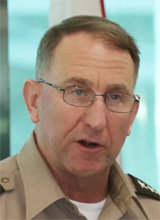USFK chief: ‘Difficult to transfer OPCON to S. Korea next year’
USFK chief: ‘Difficult to transfer OPCON to S. Korea next year’
Posted September. 21, 2020 07:36,
Updated September. 21, 2020 07:36

The Moon Jae-in administration is speeding up steps to take over wartime operational control from the U.S. within the end of its term (May 2022), but Gen. Robert Abrams, commander of United States Forces Korea, reportedly expressed to U.S. military officials his negative view on the South Korean military’s current capability to manage OPCON. Critics are raising concern that if the security environment surrounding the Korean Peninsula shakes up once again after the U.S. presidential election in November, the gap between Seoul and Washington could widen over the timing of OPCON transfer once more.
According to sources in the South Korean government on Sunday, Commander Abrams reportedly said, “When considering the South Korean military’s preparedness in drills, it would be difficult (to transfer OPCON) next year as well.” He apparently indicated that as South Korea-U.S. joint military drills have been scaled down due to the COVID-19 pandemic this year, the South Korean military is not sufficiently prepared to take over OPCON.
“It is said that the U.S. military has revealed a negative view on the capability of the South Korean military, which has been under assessment this year to take charge of a Future Command,” said a source in the South Korean military. As there was a problem with the deployment of additional U.S. troops from the U.S. mainland due to the COVID-19 pandemic at the joint military drill for this year’s second half, which ended on August 28, the two sides conducted just a run-through for validation of the operation of the Future Command to be spearheaded by the South Korean military after OPCON transfer. The second phase validation of Full Operational Capability, which was scheduled within this year, will thus have to be conducted anew next year.
Watchers here say that Washington’s somewhat negative perceptions towards OPCON transfer could be actually part of its efforts to check Seoul’s recent moves to accelerate OPCON transfer. When nominating Suh Wook as the next defense minister, an official in the South Korean presidential office said on August 28 that the message of this reshuffle includes OPCON transfer based on the South Korea-U.S. alliance. The incumbent South Korean administration adjusted its OPCON transfer schedule from “within the term in office,” which was President Moon’s presidential election pledge, to “early transfer” following Moon’s inauguration. However, the administration has reportedly been negotiating with Washington by unofficially targeting OPCON transfer in 2022.
Kyu-Jin Shin newjin@donga.com
Headline News
- N. Korea launches cyberattacks on S. Korea's defense companies
- Major university hospital professors consider a day off each week
- Italy suffers from fiscal deficits from ‘Super Bonus’ scheme
- Inter Milan secures 20th Serie A title, surpassing AC Milan
- Ruling and opposition prioritize spending amid tax revenue shortfalls







